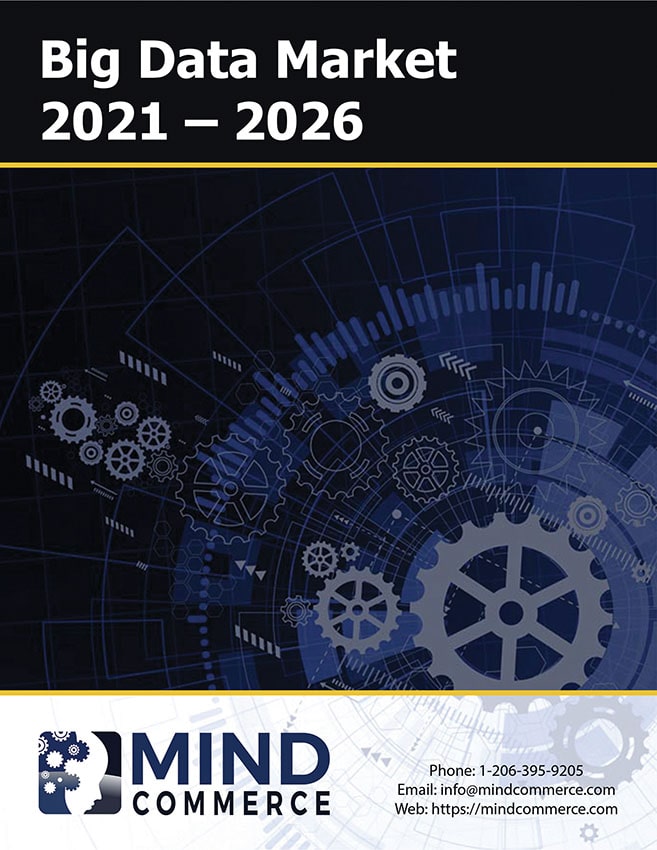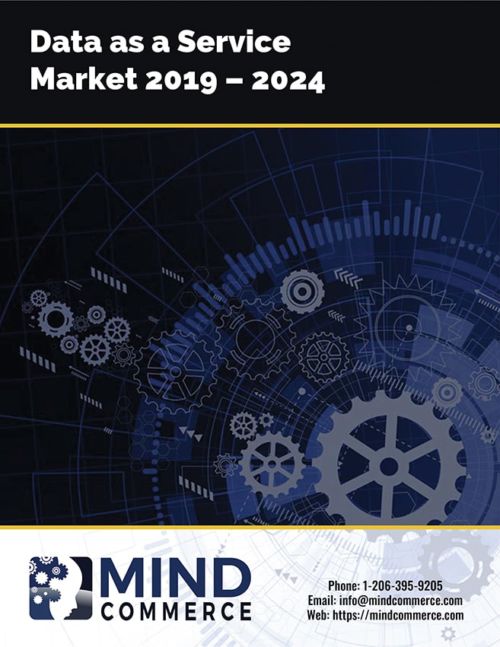Description
The big data market consists of infrastructure providers, data centers, data as a service providers, and other vendors. Solutions for managing unstructured data are evolving beyond systems aligned towards primarily human-generated data (such as social networking, messaging, and browsing habits) towards increasingly greater emphasis upon machine-generated data found across many industry verticals.
For example, manufacturing and healthcare are anticipated to create massive amounts of data that may be rendered useful only through advanced analytics and various Artificial Intelligence (AI) technologies such as machine learning and cognitive computing. The long-term prospect for these technologies is that they will become embedded in many different other technologies and provide autonomous decision making on behalf of humans, both directly, and indirectly through many processes, products, and services.
Big Data Market Dynamics
Emerging networks and systems such as IoT and edge computing will generate substantial amounts of unstructured data, which will present both technical challenges and market opportunities for operating companies and their vendors. Emerging big data tools such as open APIs much be implemented to facilitate data capture and processing with the ability to perform localized processing and decision making.
Big data solution provider dynamics are evolving almost as much as the data management technologies themselves. While some companies rely upon proprietary solutions, many leading companies such as Hortonworks and Cloudera offer products and services primarily based on open source Apache Hadoop technology. One important distinction between market leaders is collaboration vs. competition. For example, Cloudera competes with IBM, Microsoft and others in data science and AI whereas Hortonworks partners with these companies.
The big data market is experiencing profound changes across the entire technology stack including infrastructure, security, analytics, and the application layer. Mind Commerce sees the data services industry as whole shifting from host-based network topologies to cloud-based, data-centric architectures, thereby creating enormous challenges and opportunities for transitioning and securing data systems. In concert with this shift, big data infrastructure will require strategic governance and framework for optimized security.
In terms of big data integration with cloud-based infrastructure, cloud solutions allow companies that previously required large investments into hardware to store data to do the same through the cloud at a lower cost. Companies save not only money, but physical space where this hardware was previously stored. The trend to migrate to big data technologies is driven by the need for additional information derivable from analysis of all of the electronic data available to a business.
Advanced analytics provide the ability to make raw data meaningful and useful as information for decision-making purposes. AI enhances the ability for big data analytics and IoT platforms to provide value to each of these market segments. AI facilitates the efficient and effective supply of information to enterprises for optimized business decision-making. Some of the biggest opportunity areas are commercial applications, search in the big data environment, and mobility control for generation of actionable business intelligence. The use of AI for decision making in IoT and data analytics (e.g. AIoT) will be crucial for efficient and effective decision making, especially in the area of streaming data and real-time analytics associated with edge computing networks.
The ability to capture streaming data, determine valuable attributes, and make decisions in real-time will add an entirely new dimension to service logic. In many cases, the data itself, and actionable information will be the service. However, real-time data is anticipated to become a highly valuable aspect of all solutions as a determinant of user behavior, application effectiveness, and identifier of new and enhanced mobile/wireless and/or IoT related apps and services. Mind Commerce sees the AIoT market both benefitting from and supporting the big data market.
Augmented Reality (AR), Virtual Reality (VR), and Mixed Reality (MR) are perhaps best known as data intensive immersive technologies that require high bandwidth for operations. One of the least evaluated opportunities is the market opportunities associated with visualizing data and information in AR, VR, and MR environments. Much of this data will be unstructured, requiring big data analytics tools to process, categorize, and display in a meaningful manner. This will allow the end user to visualize and utilize information in ways previously inconceivable. Mind Commerce sees the virtual reality market both benefiting from and supporting the big data market.
In addition, Mind Commerce sees leading data management companies developing tools for improved general data visualization, facilitating improved information interpretation and decision making. Coupled with AI and cognitive computing, the field of advanced data visualization and analytics known as augmented analytics is transforming otherwise useless data into highly valuable and actionable smart data, often enabling dynamic decision making that may positively impact business operations as processes, transactions, and other events occur. Much of this smart data will monetized in a data-as-a-service (DaaS market) approach by enterprise thanks to leading big data service and DaaS solutions.
Big Data Market for Industry Verticals
Industry verticals of various types have challenges in capturing, organizing, storing, searching, sharing, transferring, analyzing and using data to improve business. The big data market is making a substantial impact in certain industries such as the healthcare, industrial, transportation, and retail sectors. Every large corporation collects and maintains a huge amount of data associated with its customers including their preferences, purchases, habits, travels, and other personal information. In addition to the large volume, much of this data is unstructured, making it hard to manage.
Big data technology will help financial institutions maximize the value of data and gain competitive advantage, minimize costs, convert challenges to opportunities, and minimize risk in real-time. As an example in the transportation industry, real-time applications can match loads to a vehicle’s capacity using data analytics. Big data market solutions for transport organizations enable analytics necessary to provide shipping and delivery companies with real-time notifications and updates to increase efficiency and accuracy.
Big data technologies provide financial services firms with the capability to capture and analyze data, build predictive models, back-test and simulate scenarios. Through iteration, firms will determine the most important variables and also key predictive models. Financial firms are increasingly migrating their data and analytics to the cloud, leading to reduced cost, better data management, and better customer service. Data and insights can also be transferred far quicker than before, allowing representatives to provide customers with real-time data backed insights.
Healthcare services can be applied more accurately with big data. Decisions based on real-time data and assistance from AI/ML solutions. Private health insurance providers can gain access to previously inaccessible information and databases through big data. Healthcare customer service processes can also be streamlined while providing personalized more personalized medical care to individuals. Mind Commerce sees certain vendors developing highly customized, yet scalable, big data market solutions for healthcare service providers.
Big data market analytics solutions allow retail companies to examine and interact with their audience online in new ways. Predictive analytics can analyze a consumer’s activity and recommend suggested items to them. Once a consumer has purchased from a company, big data can help retain that customer by better understanding what a person wants. For example, Amazon collects all its customers’ data to provide a personalized experience, earning up to 35% of its revenue from its customers’ data.
Customer Relationship Management (CRM) is a model of managing relationship and interaction between company and customer. This includes using technology for organizing, automating, and synchronizing all customer-related information like sales, marketing, services, support and more. Big data market software and services represent a sizable business opportunity for analytics service providers and it is poised to do more than just improve existing CRM processes and procedures. Big data is anticipated to uncover completely new ways of servicing customers.
Modern supply chains represent complex systems of organizations, people, activities, information, and resources involved in moving a product or service from supplier to customer. Data analytics is useful for Supply Chain Management (SCM) because it can analyze a variety of variables across a business’ operations. SCM service providers use advanced analytics and other big dat market solutions to analyze materials, products in inventory and imports/exports to better understand needs. This helps a business to manage its assets better, saving time and money. Data analytics can predict future risks based on history and a large set of data.
Big Data Market Report
This report provides an in-depth assessment of the global big data market, including business case issues/analysis, application use cases, vendor landscape, value chain analysis, and a quantitative assessment of the industry with forecasting from 2021 to 2026. This report also evaluates the components of big data infrastructure and security framework. Additional topics covered in this report include:
- Big Data Technology: Analysis of infrastructure and important issues such as security and privacy
- Big Data Use Cases: A review of investments sectors and specific use cases for the Big Data market
- The Big Data Value Chain: An analysis of the value chain of Big Data and the major players involved within it
- The Business Case for Big Data: An assessment of the business case, growth drivers and barriers for Big Data
- Big Data Vendor Assessment: Assessment of the vendor landscape of leading players within the Big Data market
- Market Analysis and Forecasts: Global and regional assessment of the market size and forecasts for 2021 to 2026
This report also evaluates the components of big data infrastructure and security framework. This report also provides analysis of leading big data solutions with key metrics such as streaming IoT data analytics revenue for leading providers such as Teradata, IBM, Oracle, SAS and Datameter. The report evaluates, compares and contrasts vendors, and provides a vendor ranking matrix. Analysis takes into consideration solutions integrating both structured and unstructured data.





